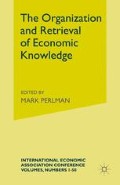Abstract
The storage and retrieval of microdata involve serious problems because of the complex documentation required. The changing computer technology and the complex data-manipulation are statistical procedures. At best, secondary use will remain expensive, and its funding a problem. Reductions in cost of access require investments in anticipation of later use which may be self justifying (by increasing that use) but cannot be funded by those future users. A stepwise procedure for access will probably involve securing and reading the initial published analysis, then securing volumes of printed documentation (code books are not enough) and ultimately securing a data file. Now there is a problem of knowing who else has worked, or is working, on the same data.
Access this chapter
Tax calculation will be finalised at checkout
Purchases are for personal use only
Preview
Unable to display preview. Download preview PDF.
Refernces
Goldberger, Arthur, ‘Maximum-Likelihood Estimation of Regressions Containing Unobservable Independent Variables’, International Economic Review, 13 (February 1972) pp. 1–15.
Zellner, Arnold, ‘Estimation of Regression Relationships Containing Unobservable Independent Variables’, International Economic Review, 11 (1970) pp. 441–54.
Learner, Edward E., ‘False Models and Post-Data Model Construction’, Journal of the American Statistical Association, 69 (March, 1974), pp. 112–1.
Griliches, Zvi, ‘Errors in Variables and Other Unobservables’ Econometrica, Vol. 42 (November, 1974), pp. 971–98.
Goldberger Arthur, and Duncan, O. D., eds., Structural Equation Models in the Social Sciences, New York and London: Seminar Press, 1973).
Morgan, J. N., ‘Using Survey Data from the University of Michigan’s Survey Research Center’, American Economic Review, May 1975.
More than one such archive might be good, allowing for some specialization. As to substantive areas (economic, political, geographic), archives already exist at the universities of Michigan, Wisconsin, Illinois, and Florida, at Williams College, at the National Opionion Research Center (Chicago), and at the Bureau of Applied Social Research (Columbia).
Author information
Authors and Affiliations
Editor information
Copyright information
© 1977 International Economic Association
About this chapter
Cite this chapter
Morgan, J.N. (1977). The Usefulness of Microdata and some Strategies for the Storing, Using, and Disposing of it. In: Perlman, M. (eds) The Organization and Retrieval of Economic Knowledge. International Economic Association Series. Palgrave Macmillan, London. https://doi.org/10.1007/978-1-349-03325-6_13
Download citation
DOI: https://doi.org/10.1007/978-1-349-03325-6_13
Publisher Name: Palgrave Macmillan, London
Print ISBN: 978-1-349-03327-0
Online ISBN: 978-1-349-03325-6
eBook Packages: Palgrave Economics & Finance CollectionEconomics and Finance (R0)

